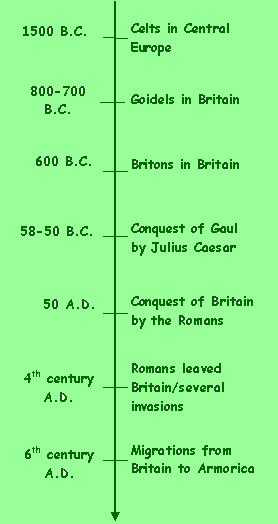 Breton and Welsh are Celtic languages, which originate from the Celts who originally came from Central Asia .
Breton and Welsh are Celtic languages, which originate from the Celts who originally came from Central Asia .
The Celts were divided into many tribes, all speaking the same language, known today as old Celtic. The only written records we find referring to the Celts come from other peoples particularly the Greeks and the Romans.
Around 1500 B.C., the Celts settled in Central Europe . Their settled territory extended from the Rhine to the Danube while they continued to move into the west of Europe .
Between 800 and 700 years B.C., the Goidels (also called Gaels) settled in Britain but they were forced to the island in the west, Ireland , by Britons around 600 B.C..
The Celts’ territory had extended from Britain to the mouths of the Danube and to plain of the Po , in Italy . By the time Julius Caesar started his conquest of Gaul , from 58 to 50 B.C., they were largely west of the Rhine , in Gaul and Britain .
The defeat of the Gauls in Alesia by the Romans, in 50 B.C. marked the end of Gaulish resistance. Around 50 A.D., the Romans started the conquest of Britain and settled there for four centuries. Brittonic and Gaulish languages were influenced by Latin and borrowed many words from it. It was the practice of the Roman army to give territories to veterans, when they completed their service. It appears that many Britons were settled in Armorica (the Roman name for Brittany ).
In the 4th century A.D., with the aim of protecting their borders in the face of Saxon and German invasions in the east, the Roman army left Britain , which left Britain vulnerable. It was a time of great population movements with pressure from the Irish from the west, followed by Saxons from the east and Norsmen from the north. Slowly, the Bretons retreated and some gradually migrated to Gaul , especially to Armorica and Normandy , where they found a similar language community. Those migrations lasted for nearly four centuries and were increased during the 6th century A.D., under the pressure of the Saxons in Britain . When the Romans arrived, Britain was a Celtic speaking country. Some 800 years later, the Celtic-speakers were concentrated in Wales , Cornwall and Scotland .
The Celtic language is now divided into two branches: Goidelic (or Q-Celtic) and Brittonic (or P-Celtic). Goidelic gave birth to Irish, Gaelic in Scotland , and Manx, while Breton, Cornish and Welsh came from Brittonic.
There is some disagreement about the birth of the Breton language. Some people believe that it was brought about by a mixture of the Gaulish of the native people and the Brittonic of the incomers. Others believe the Brittonic, which had been enriched by topographic and technical Gaulish words, was adopted by the native people from the incomers. Influenced by the surrounding languages and with the weakening of the cross-Channel relationship, the Brittonic of Armorica and that of insular Britain have become different by natural evolution.